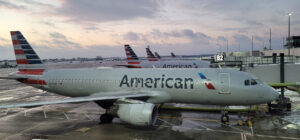Do airlines do fuel hedging for sold or for sale tickets?
#1
Original Poster
Join Date: Jun 2006
Location: California
Programs: AS,WN,UA,B6,hotels
Posts: 4,239
Do airlines do fuel hedging for sold or for sale tickets?
Do airlines do fuel hedging for sold or for sale tickets?
For example, an airline is selling tickets for flights six months from now. Will it have bought fuel futures for six months from now for the fuel for those flights? Or will it buy the fuel futures as the tickets are sold? Or will it just let fuel prices fluctuate at will and take the risk?
This would be different from Southwest's fairly well known fuel hedging where some of its fuel needs more than a year in the future (beyond the time frame for which they are selling tickets) are covered by futures contracts.
For example, an airline is selling tickets for flights six months from now. Will it have bought fuel futures for six months from now for the fuel for those flights? Or will it buy the fuel futures as the tickets are sold? Or will it just let fuel prices fluctuate at will and take the risk?
This would be different from Southwest's fairly well known fuel hedging where some of its fuel needs more than a year in the future (beyond the time frame for which they are selling tickets) are covered by futures contracts.
#2
FlyerTalk Evangelist
Join Date: Jun 2002
Location: n.y.c.
Posts: 13,989
It's not completely clear what you're asking. The hedge essentially locks in the price of the future purchase of fuel. That hedge costs money, especially if people believe it's very likely that costs are going to increase. Based on those (and other) factors, the company decides how much of its future fuel purchases it wants to hedge.
#3
Original Poster
Join Date: Jun 2006
Location: California
Programs: AS,WN,UA,B6,hotels
Posts: 4,239
I'm asking if airlines actually do this type of hedging. Seems like they should, but the way people write about how airlines get surprised by quick fuel price increases causing them to be unprofitable, it seems like they do not (or do not do it enough).
#4
Join Date: Apr 2003
Location: MSY
Programs: BA GfL
Posts: 5,936
For example, an airline is selling tickets for flights six months from now. Will it have bought fuel futures for six months from now for the fuel for those flights? Or will it buy the fuel futures as the tickets are sold? Or will it just let fuel prices fluctuate at will and take the risk?
Airlines hedge some (or none) of their future fuel purchases based on their expectations of how much total fuel they will be using in year X. The purchase of the futures contract itself costs money, like buying an insurance policy--and as nerd says, the more fuel prices are expected to rise, the more that insurance policy costs. So it is not necessarily in the airline's interest to hedge 100% of its expected fuel usage. If fuel costs end up rising less than expected, the airline could end up paying more for the insurance policy than it makes in the payout (i.e. the difference between the spot price in year X and the price they paid this year in the futures contract).
#5
Join Date: Mar 2007
Location: YVR
Programs: Aeroplan Former E
Posts: 1,022
A few airlines do hedge - Southwest being the bright light. Problem with the hedging tools is they have a cost to them. A cash flow cost (you need to put up a percentage of the hedge in cash or near cash), and a price cost (the person on the other side generally tacks on a "margin" - exactly how depends on the instrument, it could be points or it could be a higher settlement price, since they are taking the risk of a price increase. The more one-sided the movement, the higher the cost for hedging against that movement). The cash flow can be the real killer because of margin calls - a dip in oil price forces you to fork over hard cash on short notice. Airlines aren't exactly flush with the green stuff these days.
#6
Join Date: Jan 2000
Location: Nashua, NH USA
Programs: Seashore Trolley Museum "flight attendant"
Posts: 1,991
Ticket sales are unrelated to fuel hedging.
When (for the sake of argument) Southwest has hedged fuel prices to obtain X barrels at $60. per barrel, what is the total cost per barrel including the hedge fee? Or is the total cost the $60. inclusive of the fee paid to accomplish the hedge?
When (for the sake of argument) Southwest has hedged fuel prices to obtain X barrels at $60. per barrel, what is the total cost per barrel including the hedge fee? Or is the total cost the $60. inclusive of the fee paid to accomplish the hedge?





















